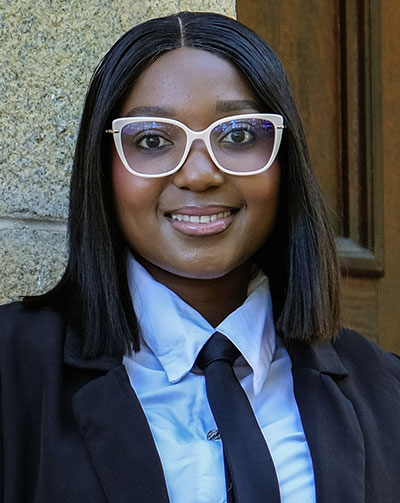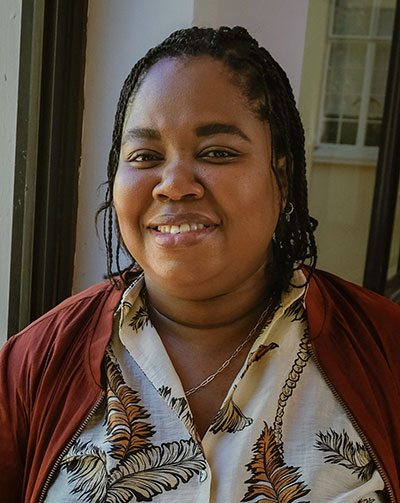Stellenbosch University (SU) recently appointed a Business Ethics Officer, Lindokuhle Sibiya, in the newly established Business Ethics Office. A new Compliance Officer, Tlotliso Molefi, was also appointed towards the end of last year. We asked our two new colleagues to share insights about their work and the difference they want to make at SU.
-
LINDOKUHLE SIBIYA, Business Ethics Officer

Sibiya is an organisational ethics professional led by the drive to impact organisations through ethical governance practices, policy reformation and leadership style transformation. She is a certified ethics officer with a master's degree in governance and political transformation (cum laude) from the University of the Free State. Her dissertation was titled “Ethical corporate governance: The impact of ethical culture in the public and private sector in South Africa. Before she joined SU, she was with The Ethics Institute where she co-authored an anti-corruption guide for civil society.
Sibiya is an organisational ethics professional led by the drive to impact organisations through ethical governance practices, policy reformation and leadership style transformation. She is a certified ethics officer with a master's degree in governance and political transformation (cum laude) from the University of the Free State. Her dissertation was titled “Ethical corporate governance: The impact of ethical culture in the public and private sector in South Africa. Before she joined SU, she was with The Ethics Institute where she co-authored an anti-corruption guide for civil society.
What is the purpose of the newly established Business Ethics Office at SU and its core functions?
The Business Ethics Office's objective is to strengthen SU's ethical culture, building on its existing foundation. While ethics has always been part of SU, the Office formalises this focus by monitoring and evaluating adherence to non-research ethical standards. Its core functions include advancing Code 2040 – SU's integrated ethics code – to ensure that decisions are guided by ethical principles, providing training and awareness, and aligning governance practices with institutional values.
What are your main responsibilities and how do they align with SU's strategic goals?
My responsibilities include fostering an ethical culture and ensuring that the University maintains high ethical standards in its business practices, through updating and upholding governance documentation, guiding decision-making and resolving ethical dilemmas. I will also focus on educating staff and faculty about ethics, promoting transparency and encouraging accountability at all levels. This aligns with SU's commitment in Code 2040 to excellence, equity, respect and accountability. Ethics must be embedded in every decision, no matter the scale, ensuring the University “walks the talk".
How do you plan to promote ethical practices and decision-making across the University community?
Key strategies include:
- Education and awareness: Conducting training to make Code 2040 practical and relevant, helping staff understand ethical behaviour in their roles.
- Clear communication: Providing accessible, practical ethical guidelines and toolkits for daily use.
- Open dialogue: Creating a safe environment for raising ethical concerns without fear of retaliation.
- Leading by example: Working with leaders to model ethical behaviour, setting the tone from the top.
These approaches will integrate ethics into daily operations, supporting a culture of responsibility and trust.
What sparked your interest in business ethics, and what experiences have shaped your career in this field?
Ethics has always been a part of my life. In high school, as deputy head girl and Director of Discipline, I promoted compliance with school rules and led disciplinary hearings. This experience highlighted how important it is to actively build an ethical culture, rather than just reacting when unethical behaviour manifests. At university, my studies deepened my appreciation for business ethics and its societal impact. This passion continued into my career, where I've learned that ethical principles like respect and compassion drive excellence and accountability. Over the years, the one golden thread has been realising that all people want to be treated ethically – it's key to fostering engagement and innovation.
How did your academic and professional background prepare you for this role?
My academic journey coincided with the release of King Code IV, shaping my understanding of corporate governance and business ethics. My master's dissertation focused on ethical corporate governance in South Africa's public and private sectors, providing me with a solid foundation in ethics. As a certified ethics officer, I've advised organisations on ethics, reformed policies and supported leadership transformation. My previous roles involved establishing ethics offices and providing governance support, experiences that prepared me for this role at SU.
What are the personal values or principles essential to fostering ethical behaviour in organisations?
Patience, kindness and a genuine understanding our differences are essential for strong working relationships. And integrity, transparency, fairness and accountability are the cornerstones of fostering ethical behaviour. When these values are embraced individually and organisationally, ethical behaviour thrives.
Outside of your professional life, what interests or hobbies help you maintain a healthy work-life balance?
I always prioritise quality time with friends and family. Nurturing these meaningful relationships is a great reminder that life is more than just our professional responsibilities. I'm not exactly someone who's super adventurous but I do prioritise traveling and seeing new places. Traveling and experiencing different cultures help me recharge and maintain balance.
What are your immediate priorities in your new position?
As a new function, the immediate priority is laying a strong foundation. This includes conducting an 'Ethics and Opportunity Risk Assessment' to establish SU's ethics profile and identify gaps in current guidelines. Training and awareness initiatives will also be enhanced to ensure the importance of ethics in business decisions is understood across the organisation.
What message would you like to convey about the importance of business ethics in higher education?
Business ethics in higher education isn't just about compliance – it's about shaping future leaders who navigate complex ethical challenges. Embedding ethics into education teaches students to consider the consequences of their decisions, not just for organisations, but for society, the environment and communities. This ensures SU graduates are equipped to make a meaningful, ethical impact in the world.
-
TLOTLISO MOLEFI, Compliance Officer

Before becoming the Compliance Officer at SU's Centre for Governance, Ethics and Compliance, Molefi served as Compliance Officer at the University of the Free State, where she contributed to establishing the office. Molefi is a compliance practitioner (SA) with the Compliance Institute of Southern Africa (CISA) and an internationally certified compliance professional (ICCP) with the International Federation of Compliance Associations (IFCA). Passionate about corporate governance and ethics, Molefi holds a postgraduate diploma in Risk Management (UNISA) and a BTech Degree in Internal Auditing.
What inspired you to pursue a career in compliance, and what drives your passion for this field?
Having started my professional career in internal audit, I always say compliance chose me. It required a significant transition, but I enjoy how it contributes to ensuring that business goals are achieved in a compliant and ethical way. The role also offers exposure to all aspects of the organisation, understanding business activities and interact with diverse stakeholders. Compliance also keeps you on your toes, given the rapid evolution of the regulatory environment. One needs to continuously anticipate potential threats and challenges which sometimes requires rapid change and adaptation.
What are the main responsibilities of the Compliance Office at SU?
SU must ensure its operations and activities are conducted in a manner that meet compliance obligations, and internal policies and procedures are complied with. The Compliance Office assists by providing the necessary support, guidance and advice to enable these actions. It plays an oversight role in ensuring that compliance control systems are effective, weaknesses are identified proactively, improvements are implemented, and internal controls are enhanced to prevent reoccurrence.
How would you describe your role and priorities?
My role is to assist, support and advise the SU community with complying with external laws and internal policies. Key priorities include identifying, assessing and managing compliance risks, and awareness and training initiatives are conducted to ensure that compliance responsibilities are understood and implemented, monitoring the level of compliance and fostering a culture of compliance.
What are your personal values that guide your work?
“Be committed to doing the right thing even when no one is watching" and “Do unto others as you would have them do unto you", which demonstrate integrity and build trust. They encourage treating others with respect, fairness and empathy.
Outside of work, what are your interests?
Spending time with my family keeps me grounded. I also enjoy meditating and listening to music – it's my therapy – and engaging in activities that stimulate my mind.
What are your goals as the Compliance Officer at SU?
I aim to continue contributing to the development of the Office. This includes developing and updating compliance governance documents, conducting compliance identification, assessments, management, monitoring and reporting. And to constantly promote an embedded compliance culture where doing the right thing is seen as the norm and compliance is viewed as the first line of defence against risks such as fines, operational disruptions or reputational harm. Compliance risk management should be matured, sustainable and integrated into SU's DNA.
What message would you like to convey to SU staff, students and stakeholders about compliance?
Compliance is not just a tick-box exercise or a barrier to business as sometimes perceived – it's a critical component of SU's operations. It helps avoid legal and financial risks, builds stakeholder trust and upholds the institution's reputation. By complying with regulatory requirements, SU demonstrates its commitment to an ethical and responsible practices and ensures the wellbeing of its stakeholders. Compliance is a team effort; therefore, it is imperative that we work as a collective because everyone associated with SU plays a pivotal role in fostering a culture of honesty, transparency and accountability to ensure a safe, ethical and responsible environment.
What excites you most about working at SU?
In just over three months, I've already seen a strong compliance model thanks to the groundwork of my predecessor. I'm excited to build on this foundation, and most importantly collaborate with the SU community, and adopt a proactive, prevention-focused approach to compliance in this rapidly evolving, dynamic and rewarding environment.
PHOTOS: Ubaid Abrahams

